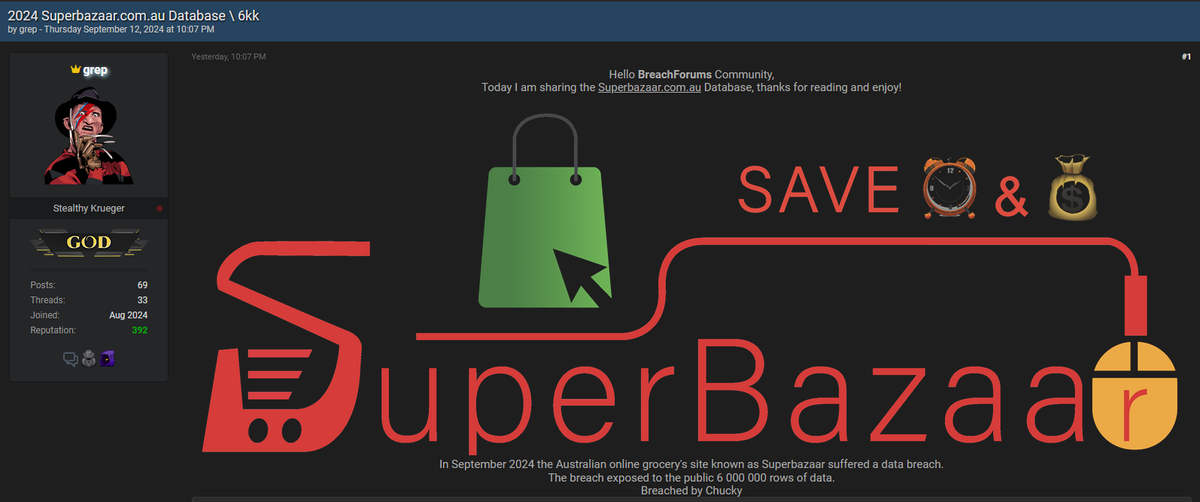Superbazaar’s Breach: How 6 Million Rows of Customer Data Got Exposed
Superbazaar.com.au hit with a massive data breach—6 million rows of customer data exposed. Is your information safe? Read more now. #DataBreach #CyberSecurity #SuperbazaarLeak

In September 2024, the Australian online grocery retailer Superbazaar.com.au fell victim to a significant data breach, exposing over 6 million rows of sensitive customer data. The breach, orchestrated by an individual or group known as Chucky, was shared openly on BreachForums, a notorious platform for trading and leaking stolen information. This incident is not just another drop in the ocean of data breaches but a stark reminder of the vulnerabilities within the e-commerce sector, especially in the grocery industry, which has seen a rising number of attacks targeting personal data.
Superbazaar.com.au is a well-established online grocery service that has catered to Australian households for years, allowing customers to purchase essential goods and have them delivered directly to their doors. Like many online retailers, Superbazaar has heavily relied on technology to streamline operations, manage customer relationships, and ensure a competitive edge in a crowded market. However, with this reliance comes a significant exposure to cybersecurity risks.
While this is the most recent and possibly the largest breach Superbazaar has experienced, it raises concerns about whether this incident was isolated or a sign of broader systemic security failings. A brief dive into the company’s history does not reveal any high-profile prior breaches, but it also suggests that Superbazaar may not have been as rigorous in publicizing or addressing minor security incidents in the past. This lack of transparency can sometimes be a red flag, indicating that internal policies for protecting customer data may not be as stringent as they appear on the surface.
The grocery industry, despite being an unlikely target in the eyes of the general public, has increasingly become a favorite for cybercriminals. Attackers have realized that companies like Superbazaar often store vast amounts of customer information, including names, addresses, payment details, and shopping habits, all of which are incredibly valuable on the black market. These data points can be used for identity theft, fraud, or even targeted phishing campaigns, making such breaches a goldmine for hackers.
Chucky, the individual behind the leak, is not a well-known figure in the hacking community, leading to speculation that this breach may have been an opportunistic exploit rather than a sophisticated or targeted operation. That being said, the scale of the breach—6 million rows of data—indicates that the attacker had access to Superbazaar’s databases for an extended period or leveraged a significant vulnerability in the company’s defenses.
For Superbazaar, the consequences of this breach will be far-reaching. Aside from the immediate impact on their customers, who are now at risk of having their personal data misused, the company will also face the potential for fines, legal action, and significant reputational damage. In the wake of this breach, Superbazaar will need to take substantial steps to reassure both customers and regulators that they are taking cybersecurity seriously.
In a post-breach world, the best course of action for Superbazaar will involve not only a transparent admission of what went wrong but also an aggressive move toward securing their systems. Enhanced encryption, regular penetration testing, and third-party audits should be the minimum standards they adopt going forward.




